Understanding Professional Zakat and the Debate Over Its Legality in Islamic Jurisprudence
Zakat is one of the five pillars of Islam and plays a pivotal role in the realm of social welfare. Derived from the Arabic root "z-k-a," which means "to purify" or "to grow," Zakat represents the act of giving a portion of one's wealth to those in need, essentially purifying one's assets while simultaneously fostering social welfare. Every Muslim is obliged to pay zakat when it reaches nisab (the minimum amount) and haul (the specified period). As the Islamic economic system is rooted in socioeconomic growth, the role of zakat is substantial.
There are three types of zakat, namely, Zakat al-Fitr, Zakat al-Mal, and income zakat. The first two are unanimously recognized by all scholars as obligatory. However, disputes still continue about whether there is a zakat named professional zakat or zakat on income, as it was not practised during the prophetic age.
In fact, what is professional zakat? How does professional zakat differ from the other two types of zakat? What are the derived benefits of imposing professional zakat?
Professional zakat, also known as zakat on income, applies to earnings from professional services and employment, such as salaries, wages, fees, and other forms of professional income. Unlike Zakat al-Fitr and Zakat al-Mal, professional zakat was not practised during the Prophet's time, which is why its legitimacy is debated among scholars.
Professional Zakat, or income Zakat, is a zakat on income similar to a tax, popularized by Shiekh Yusuf al-Qardawi to broaden the scope of the socialization of Islamic legacy. Yusuf al-Qardawi explicitly defines a profession as a job or business that independently generates income, whether conducted solo or with reliance on external entities like the government, private companies, or individuals, in return for wages, salary, or honorarium.
Although professional zakat was introduced by Wahbah al-Zuhayli in his book "Islamic Fiqh wa Adillatuh," it was brought into the limelight of jurisprudential discourse by Yusuf al-Qardawi in his book "Fiqh al-Zakat," where he dedicated a chapter to discussing various aspects and dimensions of professional zakat. According to him, zakat is obligatory on every wealth (Al-mal) that generates itself. The zakatability of an asset can be deduced based on its actual growth (نماء تحقيقي) or its potential to grow (نماء تقديري). This means the wealth must either actually or potentially provide its owner with profit and benefit.
The term professional zakat may entail salary, bonuses, remunerations, rental payments, gifts, professional services, zakat on income, zakat on agricultural products, and zakat on stocks and shares, excluding personal belongings like fixed assets at home, furniture, and home inventories. A basic motive for implementing professional zakat is to enlarge the scope of the Islamic concept of mutual social responsibility and the ethical reconstruction of social financing.
The philosophy of Shiekh al-Qardawi is a humanitarian approach, and his teachings are primarily adhered to in favor of widening the economic welfare of society.
Evidence for Professional Zakat
The obligation of professional zakat is supported by the extension of the meaning of Quranic verses such as:
- Surah Adh-Dhariyat (51:19): "وَفِىٓ أَمْوَٰلِهِمْ حَقٌّۭ لِّلسَّآئِلِ وَٱلْمَحْرُومِ" - "And in their wealth, there is a right for the poor who ask and the poor who do not receive a share."
- Surah Al-Baqarah (2:267): "يَـٰٓأَيُّهَا ٱلَّذِينَ ءَامَنُوٓا۟ أَنفِقُوا۟ مِن طَيِّبَـٰتِ مَا كَسَبْتُمْ وَمِمَّآ أَخْرَجْنَا لَكُم مِّنَ ٱلْأَرْضِ ۖ" - "O you who have believed, spend from the good things which you have earned and from that which We have produced for you from the earth."
These verses elaborate on the obligation of zakat from every good (halal) earning. Shiekh Yusuf al-Qardawi, through deductive reasoning (istinbat), derives that zakat on income also falls under permissible earnings and is considered growing wealth. Additionally, other sources such as Qiyas (analogy), Istihsan (juristic preference), Masalih Mursalah (public interest), and ‘Urf (custom) also support this obligation.
Historical Evidence
There are several historical records indicating the presence of professional zakat during the Khilafat period and the Umayyad Caliphate. The Arabic term ‘al-mal al-Mustafad’ translates to professional zakat. Traditional jurisprudential texts mention 'al-mal al-Mustafad,' which connotes the concept of professional zakat in the modern period.
- During Umar ibn al-Khattab's Caliphate: Professional zakat was imposed on honey, horses, lentils, and sea products.
- During Uthman ibn Affan's Caliphate: Zakat was imposed on net wealth after considering all deductions for the zakat payers' debts.
- Notable Companions: Several Companions, including Ibn ‘Abbas, Ibn Mas’ud, and Muawiyah, believed in the obligation of zakat on earned income.
- First Systematic Implementation: Mu’awiyah ibn Abi Sufyan was the first caliph to officially impose zakat on salaries in a systematic way.
- Reign of Umar ibn Abd al-Aziz: Zakat on income was a common practice in society.
Based on these historical facts, the debate on the imposition of professional zakat need not be prolonged.
Addressing the Prophetic Age
The question arises: why did the Prophet not include professional zakat as an obligatory practice? The answer is simple. During the prophetic age, people primarily depended on livestock and agriculture for their day-to-day expenses, which were already included as zakatable wealth. In later periods, as financial resources grew, jurists added new zakatable items to maintain the socioeconomic balance within the Islamic financial system.
For example, it would be unjust to exempt a doctor who earns millions from zakat while obligating a farmer earning a few thousand to pay zakat on their agricultural products. This evolution in the understanding of zakatable wealth ensures that the principles of social justice and economic welfare are upheld in varying contexts and times.
The Issuance of Professional Zakat
Shiekh Yusuf al-Qardawi proposes three methods for calculating professional zakat, based on haul (the specified period) and nisab (the minimum amount)[1]:
- Gross Expenditure Method:
- Description: Zakat is issued on gross income. This means zakat is paid on income that reaches the nisab of 85 grams of gold within a year. The zakat is calculated at 2.5% immediately upon receipt before deducting any expenses.
- Example: If someone earns 400,000 per month, then annually it amounts to 4,800,000. Zakat at 2.5% of 4,800,000 would be 120,000.
- Basis: This method is supported by scholars like Az-Zuhri and Auza’i. Az-Zuhri explained, "If a person earns income and wants to spend it before the month of obligatory zakat comes, then he should immediately issue zakat first before spending it" (Ibn Abi Shaybah, Al-Mushannaf, 4/30).
- After Deducting Work Operations:
- Description: Zakat is calculated after deducting work-related operational costs, such as transportation charges, rent, electricity, and miscellaneous expenses.
- Example: If the individual has operational costs of 50,000 per month, annually this would be 600,000. Therefore, the net income would be 4,800,000 - 600,000 = 4,200,000. Zakat at 2.5% of 4,200,000 would be 105,000.
- Expenditure or Net Zakat Method (Haddhul Kifayah):
- Description: Zakat is issued on the net amount of money after deducting daily expenses, including food, housing, debt, and other essentials for the donor, his family, and dependents. The obligation arises when the remaining amount reaches the nisab.
- Basis: This method is based on the hadith narrated by Imam Al-Bukhari from Hakim bin Hizam that the Prophet (SAW) said: "It is best for zakat to be issued from excess needs" (Elpianti Sahara Pakpahan, 2018).
- Consideration: According to this method, if liabilities exceed assets, the person is regarded as poor, even if they earn a substantial income.
Haul for Professional Zakat
Scholars dispute whether haul (the passage of one lunar year) is mandatory for professional zakat. Yusuf al-Qaradawi states that the obligation of zakat arises when the asset meets all zakat requirements, including reaching nisab, being debt-free, and being surplus from basic needs.
This perspective is based on the understanding that professional income, unlike traditional forms of wealth accumulation, is continuous and regular, and thus the timing of the zakat obligation may differ from that of other forms of zakat.
Professional Zakat: A Global Perspective
In the modern Islamic financial system, several countries have mandated professional zakat to be given on a yearly basis. Countries such as Indonesia, Malaysia, and various Middle Eastern nations have adopted policies regarding zakat collection and distribution, including zakat on income as an obligatory practice.
Indonesia:
- In 2002, the Indonesian Ulema Council (MUI) issued a fatwa stipulating that any income—including salary, honorarium, and wages—obtained through legal means (such as from doctors, lawyers, consultants, and other professionals) must be issued as zakat if it satisfies the requirements of the zakat obligation.
Malaysia:
- In Malaysia, zakat on income is mandated by national fatwas. A significant amendment in 2003 established the basis for calculating zakat on salary and income as the gross annual income, with a zakat rate of 2.5% of the total income. The official statement is:
"Muzakarah has determined that the basis for calculating zakat on salary and income is gross annual income, and the zakat rate is 2.5 percent of total income."[2]
Disagreements on the Obligation of Professional Zakat
Despite the widespread adoption, there are several disagreements regarding the obligation of professional zakat. Prominent scholars and councils have expressed their objections, including:
- Wahbah al-Zuhayli: He and others argue that professional zakat was not practiced during the prophetic period and is not found in classical texts.
- Ali As-Salus: Similarly rejects the concept based on its absence in early Islamic practice.
- Sheikh Bin Baz: Along with the Council of Senior Scholars (Hi'ah Kibaril Ulama), does not endorse professional zakat for the same reasons.
- PERSIS Hisbah Council and Bahtsul Masail NU: These councils reject the presence of professional zakat and instead use trade zakat in its place.
These objections are grounded in the belief that introducing a new category of zakat not explicitly outlined during the prophetic era and not found in classical jurisprudential texts could be seen as an unwarranted innovation.
Conclusion
While professional zakat is mandated and practised in several countries to adapt to contemporary economic conditions, it remains a contentious issue among scholars. The debate centres around the adaptation of Islamic financial principles to modern economies versus the adherence to classical interpretations of zakat obligations. As a result, the acceptance and implementation of professional zakat vary significantly across the Islamic world.
References
Abdullah, S., Rahman, A. A., & Abdullah, L. H. (2023). Exploring Zakatable Wealth from Classical and Contemporary Scholars Perspectives. UMRAN, 10(2), 53–70. https://doi.org/10.11113/umran2023.10n2.614
Adnan, M. A. (2017). The need of establishment of professional Amil Zakat to enhance the future zakat development. International Journal of Zakat, 2(1), 71–79. https://doi.org/10.37706/ijaz.v2i1.16
Husain, H., Hamzah, N., Asse, A., & Kara, M. (2019). Yusuf Al-Qaradawi Concept on professional Zakat. International Journal of Multicultural and Multireligious Understanding, 6(6), 1. https://doi.org/10.18415/ijmmu.v6i6.1185
Ihsan, A., & Agustur, A. (2022). Revitalization of The Collection of Zakat Funds in Indonesia: An Explana-tion from Yusuf Al-Qaradawi’s Fiqh Al-Zakah. Journal of Islamic Economics Lariba, 8(2). https://doi.org/10.20885/jielariba.vol8.iss2.art10
Nurlaelawati, E. (2010). Zakat and the concept of ownership in Islam: Yusuf Qaradawi’s Perspective on Islamic Economics. Al-jamiah, 48(2), 365–385. https://doi.org/10.14421/ajis.2010.482.365-385
Endnotes
[1] Umari , Z. F. (2022, February). Nishab and how to issue professional zakat in Islamic law
[2] Paizin, M. N. (2021, July 20). The concept of zakat on income in Malaysia
About the author
Mohamed Miras MT is a PG student at Department of Islamic Economics and Finance, Darul Huda Islamic University, Chemmad.
Disclaimer
The views expressed in this article are the author’s own and do not necessarily mirror Islamonweb’s editorial stance.

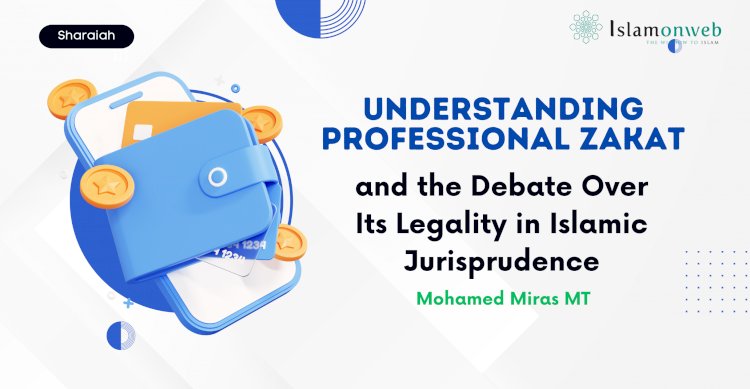


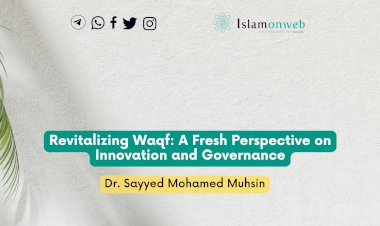

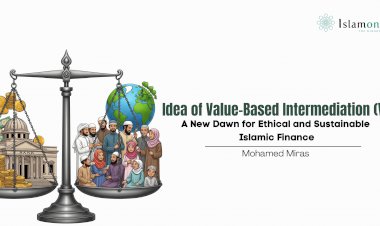
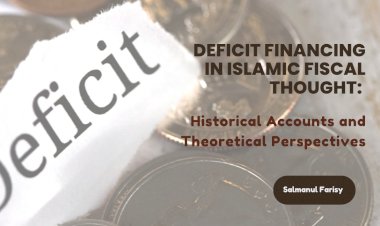

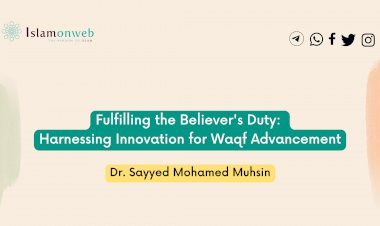














Leave A Comment